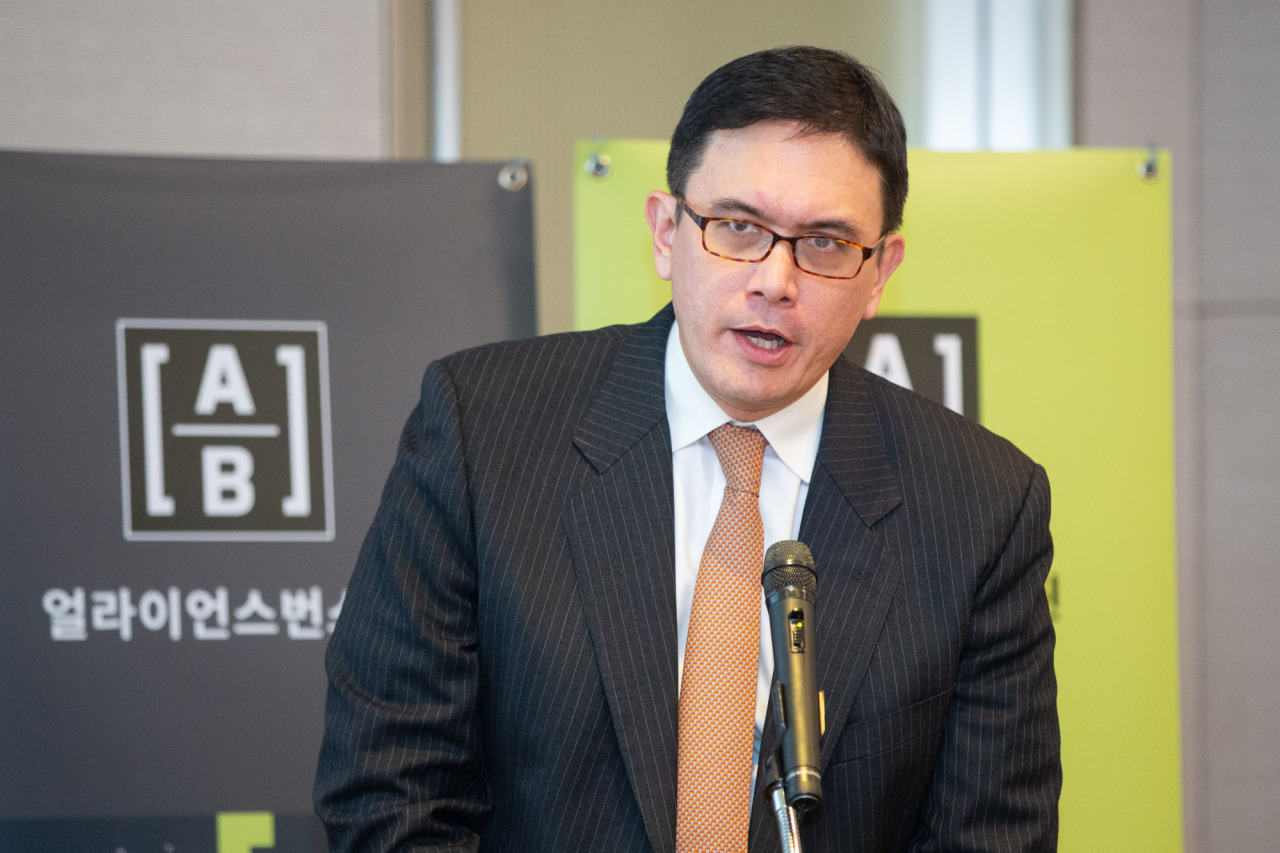Cyclical risk persists in Korean equity market: AllianceBernstein
By Son Ji-hyoungPublished : Jan. 21, 2020 - 15:50

Lingering uncertainties due to cyclical risk across emerging markets in Asia are leaving long-term prospects for South Korea’s equity market unclear, despite its recent buoyance in the technology sector, an analyst at global asset management firm AllianceBernstein said Tuesday.
“The technology-led revival in earnings will benefit Kospi earnings-per-share growth in 2020, but there is cyclicality to those earnings, so the outlook for 2021 remains unclear,” David Wong, senior investment strategist at AllianceBernstein, told reporters at a media event in Seoul upon the release of the firm’s first global capital market outlook report this year.
This comes in line with “magnified” differences in earnings growth across Asian equity markets, according to Wong -- in contrast to the US market, which delivered consistent earnings growth in the times of global economic slowdown.
According to AllianceBernstein, US equities were more defensive than other regions. It cited a 3.5 percent rise in US equities’ post-peaks performance in the Global Wave -- a compilation of seven global indicators by Bank of America-Merrill Lynch -- as of October 2019, in contrast to the emerging market’s 9.1 percent drop in post-peaks performance.
“When global tide is going out, we find that US is the only market that consistently on average delivered positive return in deteriorating global economic environment,” Wong said. “I find the valuation differential argument between the emerging market and the US to be quite unconvincing.”
Wong recommended that investors in equity keep 55 percent of their holdings in US equities, saying 20 percent should go to emerging markets.
The US technology and health care sectors deserve more spotlight, as they recorded high returns on investment in 2019 while their price-to-book ratio was comparatively low, Wong added
Meanwhile, Yoo Jae-heung, a senior portfolio manager of fixed income at AllianceBernstein’s Korean unit, said the company would stick to a “barbell strategy,” where its fixed income portfolio is a dynamic mix of a high-yield corporate bonds and other credit assets with high-quality government debt. AllianceBernstein recorded a 15 percent yield in emerging market fixed income assets in 2019.
Based in New York, AllianceBernstein managed $592 billion worth of assets as of end-September, with a focus on fixed income, equity and multi-asset strategies.
AllianceBernstein established a Korean unit in 2003. The Korean arm, currently known as AllianceBernstein Asset Management Korea, managed 1.6 trillion won ($1.4 billion) worth of assets as of end-2019 through 13 investment trusts that pooled Korean investors’ money.
By Son Ji-hyoung (consnow@heraldcorp.com)
“The technology-led revival in earnings will benefit Kospi earnings-per-share growth in 2020, but there is cyclicality to those earnings, so the outlook for 2021 remains unclear,” David Wong, senior investment strategist at AllianceBernstein, told reporters at a media event in Seoul upon the release of the firm’s first global capital market outlook report this year.
This comes in line with “magnified” differences in earnings growth across Asian equity markets, according to Wong -- in contrast to the US market, which delivered consistent earnings growth in the times of global economic slowdown.
According to AllianceBernstein, US equities were more defensive than other regions. It cited a 3.5 percent rise in US equities’ post-peaks performance in the Global Wave -- a compilation of seven global indicators by Bank of America-Merrill Lynch -- as of October 2019, in contrast to the emerging market’s 9.1 percent drop in post-peaks performance.
“When global tide is going out, we find that US is the only market that consistently on average delivered positive return in deteriorating global economic environment,” Wong said. “I find the valuation differential argument between the emerging market and the US to be quite unconvincing.”
Wong recommended that investors in equity keep 55 percent of their holdings in US equities, saying 20 percent should go to emerging markets.
The US technology and health care sectors deserve more spotlight, as they recorded high returns on investment in 2019 while their price-to-book ratio was comparatively low, Wong added
Meanwhile, Yoo Jae-heung, a senior portfolio manager of fixed income at AllianceBernstein’s Korean unit, said the company would stick to a “barbell strategy,” where its fixed income portfolio is a dynamic mix of a high-yield corporate bonds and other credit assets with high-quality government debt. AllianceBernstein recorded a 15 percent yield in emerging market fixed income assets in 2019.
Based in New York, AllianceBernstein managed $592 billion worth of assets as of end-September, with a focus on fixed income, equity and multi-asset strategies.
AllianceBernstein established a Korean unit in 2003. The Korean arm, currently known as AllianceBernstein Asset Management Korea, managed 1.6 trillion won ($1.4 billion) worth of assets as of end-2019 through 13 investment trusts that pooled Korean investors’ money.
By Son Ji-hyoung (consnow@heraldcorp.com)








![[Hello India] Hyundai Motor vows to boost 'clean mobility' in India](http://res.heraldm.com/phpwas/restmb_idxmake.php?idx=644&simg=/content/image/2024/04/25/20240425050672_0.jpg&u=)










